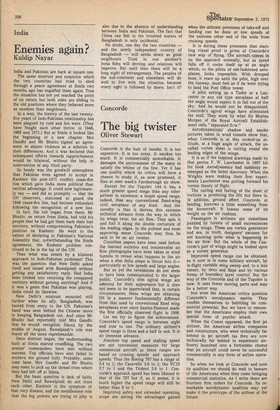India
Enemies again?
Kuldip Nayar
India and Pakistan are back at square one.
The same mistrust and suspicion which the two countries had tried to shed through a peace agreement at Simla two months ago has engulfed them again. True the situation has not yet reached the point of no return but both sides are sliding to the old positions where they behaved more as enemies than neighbours.
In a way, the history of the last twentyfive years of Indo-Pakistan relationship has been plagued by cold and hot wars. (They have fought each other thrice: in 1948, 1965 and 1971.) But at Simla it looked like the beginning of a new chapter. Mrs Gandhi and Mr Bhutto signed an agreement to abjure violence as a solution to their differences. And it was declared that subsequent efforts towards rapprochement would be bilateral, without the help or intervention of any third party.
So heady was the goodwill atmosphere that Pakistan even agreed to accept in Kashmir the post-1971 conflict cease-fire line which gave India more political than tactical advantage. It could now legitimately say — and did so promptly — that the UN observers, stationed to guard the 1948 cease-fire line, had become redundant following the recognition of a new line.
In fact, the rub began from there. Mr Bhutto, on return from Simla, had told his people that he had got them back their lost territory, without compromising Pakistan's position on Kashmir. He went to the extent of declaring in Pakistan's National Assembly that, notwithstanding the Simla agreement, the Kashmir problem continued to be in the lap of the UN.
Then what was meant by a bilateral approach to Indo-Pakistan problems? This was the question that New Delhi asked itself and raised with Rawalpindi without getting any satisfactory reply. Had India been tricked into returning the conquered territory without gaining anything? And if it was a game that Pakistan was playing, India could do likewise.
New Delhi's mistrust mounted still further when its ally, Bangladesh, was barred from entry to the UN. Pakistan's hand was seen behind the Chinese move in keeping Bangladesh out. And since Mr Bhutto had reportedly told Mrs Gandhi that he would recognise Dacca by the middle of August, Rawalpindi's role was found all the more reprehensible.
Once distrust began, the understanding built at Simla started crumbling. The two armies' commanders have met without success. Top officials have also failed to retrieve the ground fully. Probably, some time later, Mrs Gandhi and Mr Bhutto may meet to pick up the thread from where they had left off at Simla.
But the basic question is lack of faith; New Delhi and Rawalpindi do not trust each other. Kashmir is the symptom of that very disease, and the meddlesome role that the big powers are trying to play is also due to the absence of understanding between India and Pakistan. The fact that China can fish in the troubled waters of Bangladesh is only incidental.
No doubt, one day the two countries — and the newly independent country of Bangladesh — will settle down as good neighbours. Trust in one another's bona fides will develop and relations will improve. But until then there will be a long night of estrangement. The peoples of the sub-continent and elsewhere will do well to live with the situation because every night is followed by dawn. Isn't it?






































 Previous page
Previous page